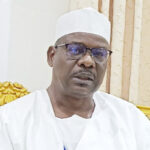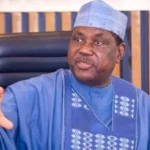In this interview, a former chieftain of the defunct National Sports Commission (NSC), Malam Abba Yola (Ciroman Yola) in Kano State, said that lack of sporting facilities is one of the major problems that have bedevilled sports development in northern Nigeria. The Chief of Staff to the Minister of Sports Sunday Dare, also said too much emphasis on football and lack of knowledge on the part of some of the governors had contributed to the yawning gap between the North and South in the area of sports development.
Generally speaking, what would you say are the factors militating against sports development in the North?
The problem with sports development in the North didn’t start today. It is a complex. So many issues are involved. Personally, I will say the lack of sporting facilities in the North is a fundamental problem. There is over concentration on football to the detriment of other sports.
- 2023: Osinbajo, Tinubu, S/West APC leaders push for common ground
- Meet Kano student making fortune from selling fruit online
When a stadium is built in the North, there is hardly any provision for other sports like basketball, volleyball, handball, swimming, track and field, and many others. This has become a norm. In the whole of the North, it is only Kaduna State that successfully hosted the National Sports Festival. This is because the state can cater for all sports.
Only few stadiums in the North like the Sani Abacha Stadium and Abubakar Tafawa Balewa Stadium, Bauchi have indoor sports halls. Few stadia like Muhammadu Dikko in Katsina, Pantami stadium in Gombe have tracks for athletics. But if you go to the South, states have built so many stadiums of international standard. Delta, Bayelsa, Rivers, Lagos, Edo State are doing well in sports because they have put in place standard facilities for the discovery and training of budding athletes. So I believe that if northern states can tackle the problem of lack of facilities, it will be able to bridge the gap in sports development between the North and South. Football fields are everywhere in the North but the same can’t be said of other sports. Of course, provision of sports facilities is capital-intensive, but it can be achieved with proper planning.
Since there are competing demands for available funds, what do you suggest northern state governors should do to provide the needed sports facilities?
As I hinted earlier, provision of these facilities is capital-intensive, but it can be done in installments. It can be done one facility at a time. For instance, you can provide for a swimming pool in the budget. After that, you move on to, let’s say an indoor sports hall. Another year, you can focus on another facility. If you decide to do everything at once, it will definitely be overwhelming. The provision of facilities can be done in phases.
Would you say northern state governors are enthusiastic about sports?
I can say that some of them are interested in sports. And even those who are not passionate about sports shouldn’t be blamed because money spent on the sector does not yield profits as is the case with other business investments.
Money usually released to sports ministries is spent on athletes’ welfare, as well as preparation and participation in championships. It is not like the Ministry of Works that can build houses or bridges for everyone to see. So, most of the governors are yet to know that money spent on sports basically produces honours only. When you win or hold bragging rights at a sporting event, it can be said to be the profit for the money spent.
For those who don’t know this truth, spending on sports is a waste of resources. However, to win, you must invest heavily in facilities and development of athletes. Unfortunately, most of the governors look at the money required for sports development as something they can use to provide infrastructures for the people.
What do you think should be done to change the perception or lukewarm attitude of some of the governors towards sports?
Appointing sports technocrats as special advisers on sports or commissioners of sports will go a long way in helping to awaken the interest of the governors. Most of them are not against sports, but they need to be convinced that spending scarce resources on the sector is not a waste. I believe that if they are given a new orientation about sports they will be more accommodating and willing to spend.
They must be made to understand that sports breed peace and unity. It also helps in curbing social vices by positively engaging the youth. And by the time some of the sports loving governors begin to tease or challenge their counterparts at their meetings, those who are foot-dragging would surely sit up.
There is also this notion that the North is lagging behind in the area of sports because of socio-cultural and religious inhibitions. How true is this?
This is not completely true. People talk about religion, but it does not stop anyone from taking part in sports. Once you observe it at the right time, there will be no problem. The only challenge is that of prayer. In Saudi Arabia, football and other sports are played and they always maintain this religious aspect. They play after prayer. They allow everybody to first pray, then go to play. If you can’t observe your prayers at the given time, it becomes a problem. But God in his wisdom has, through the prophet Mohammed, phased the prayers so that you can time it and do what you want to do. In addition, you can read the Koran at any time. So religion cannot be an inhibition.
It is also said that lack of attractive incentives makes athletes in the North susceptible to poachers from the South. How do you react to this?
It is true that the North has lost so many talented athletes who were lured to go and compete for southern states, especially at the National Sports Festival. However, states in the North are now paying more attention to the welfare of their athletes, to such an extent that we now see some athletes from the South competing for northern states. Most of the states now enrol their athletes in civil service payroll. This policy, which is implemented in states like Kano, has reduced the number of times administrators visit government houses for funds.
Apart from the provision of facilities, what else do you think northern states can learn from their southern counterparts in the area of sports development?
I want to advise states in the North to consider giving scholarships to their athletes the way the southern states are doing. They give scholarships to their athletes to study and develop their skills abroad. They are placed on allowances, which gulp so much money, but in the end, they gain through the medals these athletes win at major championships.
Like I said, states in the North are beginning to pay more than casual attention to the welfare of their athletes, but they must do more in terms of sponsoring budding athletes abroad where they would be exposed to world class facilities and training.
There is also the need for states to encourage young athletes to combine sports with education. There is life after sports. Someone who is educated will remain useful to himself and the society, even after retirement. Unfortunately, unlike in the past, schools are no longer making provision for sporting facilities and activities. In the past, schools were granted approvals only when they provided evidence of sporting facilities.
Continued on www.dailytrust.com.ng
How much is the girl-child in the North encouraged to take part in sports?
Opportunities are there for the girl child to participate in sports in line with Islamic injunctions. It is the Islamic aspect of it that we must strictly observe. But there is no place in the Koran where it is stated that girls shouldn’t take part in sports. It is how they do it that matters. The International Olympics Committee (IOC) has approved the use of hijab for female athletes who are Muslims. The dress code is there. So what they need to do is to abide by it. They are allowed to dress the way their religion says, not what the sport states.
As a sports administrator of repute, what is your advice to northern youths who are into sports?
I feel sad about the state of sports in the North. You can’t eat your cake and have it. The youth must be ready to go out there and slug it out with others. If you want to wear the green-white-green jersey of Nigeria, you must be ready to sweat and even spill blood. Nothing good comes easy. You must begin to ask yourself a pertinent question: What am I going to do to be successful?
It is said that you can force a horse to the river but you can’t force it to drink water. The government may provide the facilities, but if the youth are not willing to work hard, it will make no difference. More importantly, they must be ready to combine education with sports.
Schools should also key into the recently resuscitated National Principals’ Cup for secondary schools to develop hidden talents.
Sports in the North shouldn’t be about football only. The youth should try and discover their hidden talents in other sports like athletics, basketball, volleyball, handball, swimming and others. Since hard work pays handsomely, the youth must arise and prove their mettle in sports.

 Join Daily Trust WhatsApp Community For Quick Access To News and Happenings Around You.
Join Daily Trust WhatsApp Community For Quick Access To News and Happenings Around You.


